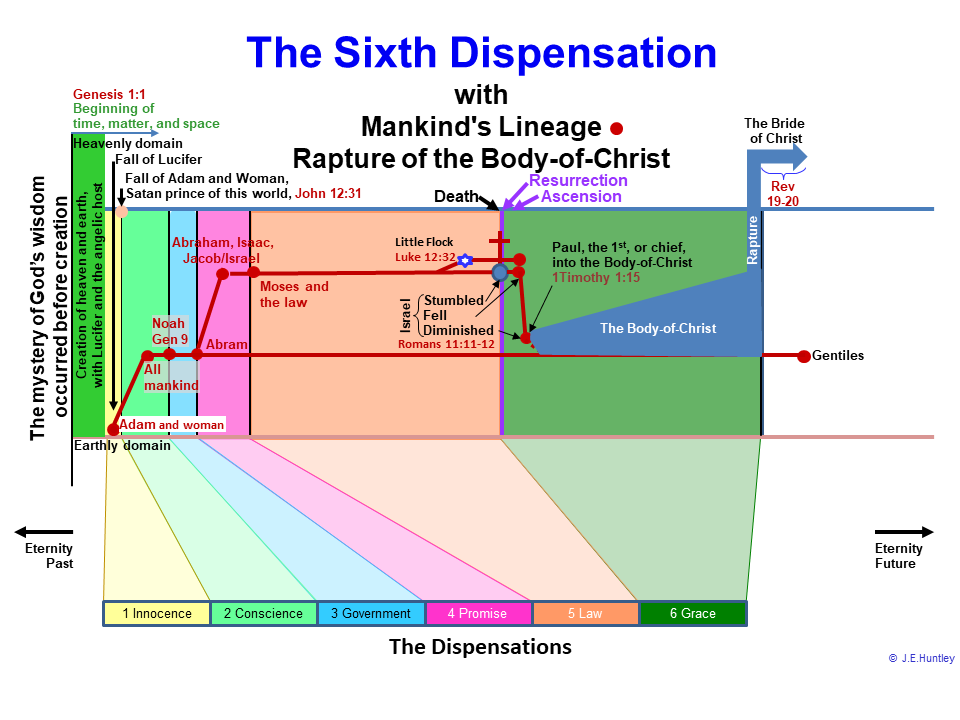Interpretations: Dispensation of grace
The dispensation of the law was complete with the suffering and death of Jesus on the cross. Isaiah wrote that it pleased the Lord to bruise him, to make His soul an offering for sin. After seeing the travail of the soul of Jesus, God the Father was satisfied, which led to many being justified by the Lord’s righteousness, Isaiah 53:10-12. So, Christ Jesus once offered to bear the sins of many, unto those that look for the Lord to appear the second time without sin unto salvation, Hebrews 9:28.
The dispensation of grace began with the resurrection of Christ Jesus. Paul wrote that Jesus our Lord was raised from the dead for our justification, Romans 4:24-25. Peter also wrote concerning this dispensation of grace. The prophets had inquired and searched diligently concerning when this grace would appear, 1Peter 1:10. He wrote that each person in the Jewish church who received the gift, were to be good stewards of the manifold grace of God, 1Peter 4:10.
The Lord had trained His apostles during His earthly ministry, often taking them away from the crowds for their rest and teaching, Mark 6:30-32, Luke 11:1. Similarly, the Lord gave the experience to His apostles, after choosing the 12, to go throughout Israel, preaching the kingdom of God to the lost sheep in Israel only, avoiding Samaria and the Gentiles. They were to teach that the kingdom of heaven was at hand, and that they should repent, Matthew 10:1-15, Mark 6:7-12. In the teachings and prophecies given to Israel, the next event they were to look for was the coming king, sitting on the throne of David, ruling the world from Israel, as shown in the following graphic. What was not revealed to them, but kept hid from Israel, were the revealed mysteries to Paul, which was the Body-of-Christ, Romans 16:25-26.
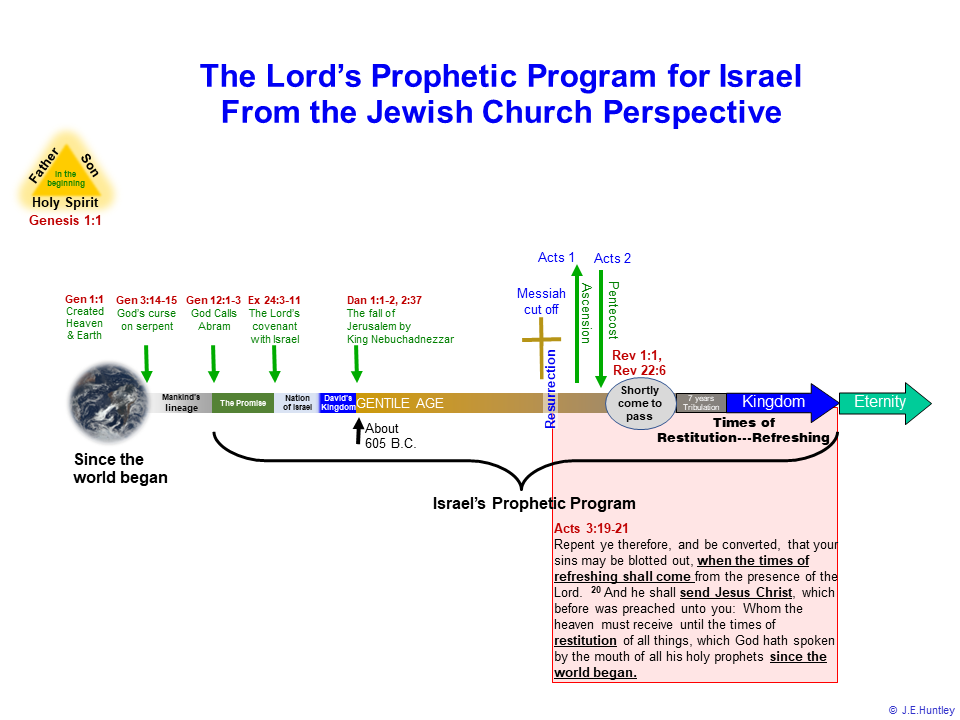
After the Lord’s ascension, and on the day of Pentecost, the apostles continued with teaching of the gospel of the kingdom, which started with John the Baptist, Matthew 3:2, then Jesus continued that message after the arrest of John, Matthew 4:17. On the day of Pentecost, Peter spoke to the crowd that gathered after hearing the outpouring of the Holy Spirit upon the apostles and disciples, Acts 2:2-6. Peter told them that he and the other apostles witnessed the resurrection of the Lord, and that because Christ Jesus is now seated at the right hand of the Father, that He gave the promise of the Holy Spirit, and that the one they crucified is both Lord and Christ, Acts 2:32-36. In other words, Christ Jesus is now positioned to return at any time, Psalm 110:1-7, Psalm 2:5-9. Peter then presented the message of the kingdom, to repent and be baptized in the name of Jesus Christ, for the remission of sins, and to receive the gift of the Holy Spirit, Acts 2:38-43. This is what they were commanded by the Lord to say as they preached the gospel to every creature, that he who believes and is baptized will be saved, Mark 16:16. Peter further testified to the leaders of Israel that there was no other name under heaven that a man could be saved, Acts 4:12.
This mission of the Little Flock continued, centered in Jerusalem, until Stephen was martyred for the name of Jesus and Stephen’s witness, Acts 6:15, 7:55-60. Following the death of Stephen, the Holy Spirit revealed Saul, later to be called Paul, Acts 13:9, from those who were persecuting the early church, Acts 7:58, to carry the message of salvation to the Gentiles, Acts 9:15. It was then Israel fell, and salvation was given to the Gentiles, Romans 11:11. As Saul fiercely persecuted believing Jews in Jerusalem, they evacuated Jerusalem to other parts of along the eastern Mediterranean Sea, preaching the good news to Jews only, Acts 11:19. Up to this time, during the dispensation of promise and of the law, Gentiles could only be saved by either blessing the seed of Abraham, Genesis 12:1-3, or by being proselyted into Israel by circumcision, Exodus 12:48. For according to Paul, the Gentiles, the uncircumcised, were outside the commonwealth of Israel, the circumcision, Ephesians 2:11-13.
Thereafter, Luke begins to follow Saul/Paul, whom the Holy Spirit was leading to build churches among the Gentiles, Ephesians 3:2, Colossians 1:25. On his first missionary journey to the Gentile nations, he and Barnabas went first to the synagogue in Antioch in Pisidia, Acts 13:14, saying that they were commanded by the Lord to be sent as a light to the Gentiles, Acts 13:46-47. Paul wrote to the Ephesians and Colossians that he was given the dispensation of grace to give to the Gentiles. He taught that believing Gentiles are fellow heirs, of the same body and partakers of His promise in Christ through the gospel, Ephesians 3:1-6; the gospel being the death, burial and resurrection of Christ Jesus, 1Corinthians 15:1-4. Again, Paul wrote to the Body-of-Christ, that he was the minister according to the dispensation of God that he received for us, to fulfill the Word of God, Colossians 1:25.
The following graphic shows the dispensation of grace immediately following the death, burial, and resurrection of Jesus Christ and the activities of Israel that continued into the beginning of this period of time.
The following graphic shows the dispensation of grace immediately following the death, burial, and resurrection of Jesus Christ and the activities of Israel that continued into the beginning of this period of time.
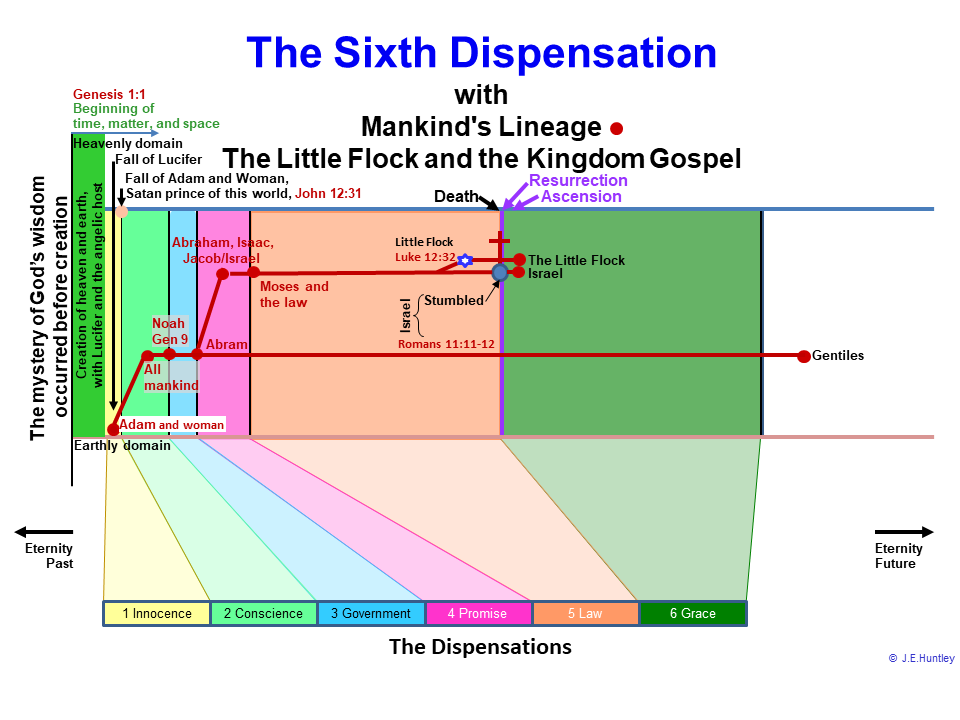
There are two sections in this dispensation that are distinct, in that it is manifested through two assemblies. Both exist because of the gift of God, through the redemptive work of Christ Jesus by His blood shed on the cross for our redemption, Ephesians 2:8-9, John 1:12-13.
The first assembly is the “Little Flock,” who were the 12 apostles, and the other disciples. Two of these disciples who also followed Jesus, were Joseph called Barsabas, who was surnamed Justus, and Matthias, Acts 1:23. They followed Jesus during His 3 ½ years of earthly ministry, Luke 12:32. He spent that time teaching and equipping the apostles to continue His ministry after His death and ascension, John 14:12, Luke 24:44-49. On the night Jesus was betrayed, He warned His apostles that they would scatter and flee from Him on the night of His arrest, Matthew 26:30-32, Mark 14:50. Their ministry restarted when they saw Jesus on the day of His resurrection, John 20:19-23, and after He breathed the Holy Spirit upon them, John 20:22. They continued for a short time into the dispensation of grace. There were about 120 believers in the upper room to receive the power of the Holy Spirit on Pentecost, Acts 1:15, Acts 2:1-5. Pentecost was the fourth of seven feasts God gave to the nation of Israel and they were to observe annually.
- The Lord’s Passover, Leviticus 23:5
- Unleavened bread, Leviticus 23:6
- Firstfruits of the harvest, Leviticus 23:10-11
- Fifty days (Pentecost), Leviticus 23:16-17
- Blowing of trumpets, Leviticus 23:24
- Day of atonement, Leviticus 23:27
- Feast of tabernacles, Leviticus 23:34
All the males of Israel were commanded by God to appear before the Lord in Jerusalem with an offering three times each year, during the feast of weeks (Pentecost), as well as the feast of unleavened bread and tabernacles, Deuteronomy 16:16.
Those believing Jews who were in Jerusalem waiting for the promise of the Father, which was the Holy Spirit, Acts 1:4, 8. This was the same time that many other Jews were present in Jerusalem to celebrate the feast of weeks, or Pentecost. In the morning, as the Little Flock were in the house waiting as instructed by the Lord, suddenly, there was heard the great noise emanating from within the house that all in Jerusalem could hear. This is when the apostles and disciples of Jesus Christ received the power of the Holy Spirit, Acts 1:8, 2:1-5. At that time, Peter stood up and preached to the men of Israel who gathered about the house to investigate this unique event, Acts 2:14. Peter spoke of the resurrection of Christ Jesus, His ascension, and that He was sitting at the right hand of God. He also explained that the believers in Christ Jesus had just received the power Holy Spirit, as promised by God the Father, Acts 2:30-33. After hearing Peter speak, that they, as Jews, crucified their Lord and Christ, the people were pricked to the heart and asked what they should do! Peter told the Jews to repent and be baptized in the name of Jesus Christ the remission of sins, then they would receive the gift of the Holy Spirit, Acts 2:36-38. About 3,000 people were added to the group of disciples, Acts 2:41, all continuing daily with one accord in the temple, with singleness of heart, Acts 2:46.
At a later time, Peter and John went to the temple at the hour of prayer. As they approached the temple, they observed a man who was lame from birth, begging. Catching the attention of Peter and John, Peter spoke to the man and suddenly the lame mans was healed. This caught the notice of the people round about, who realized that a miracle occurred, Acts 3:6-9. Then Peter preached to the Jewish crowd, telling them that through ignorance they killed the Prince of Life, whom God raised from the dead, and Peter and the other apostles were witnesses to the resurrection of Jesus, Acts 3:14-17. He also preached the kingdom gospel, instructing them that they were to repent of their sins. Since the apostles witnessed the Lord’s ascension and Him sitting on the right side of the throne of God, Acts 1:9-11, 2:30-33, it was proof that Christ Jesus was alive. Peter pointed out to the crowd that their patriarch David was dead and buried, but Christ Jesus was alive in His glorified body. Because of this, the disciples understood that Jesus could return at any time to sit on the throne of David as soon as the Father makes the foes of Christ His footstool, Acts 2:25-35, Psalm 89:3-4. If those Jews present would repent, then their name would not be blotted out when the Lord returned to restore all things, which had been spoken by the mouth of all the prophets since the world began, Acts 3:19-22.
At that time, all the believers in the Lord Jesus Christ looked forward to the return of Christ Jesus, their Messiah, in their lifetime to establish His kingdom on earth, and sit on the throne of David. This was the gospel of the kingdom that John the Baptist and Jesus both spoke of during their earthly ministry, John 3:1-2, John 4:12-17. Even before the Lord’s ascension, they asked if He would restore the kingdom of Israel. The Lord did not diminish their expectation, He only told them that it was not God’s will to reveal to them the times or seasons, it was God’s secret that He would retain until His time came to reveal it, Acts 1:6-8, Deuteronomy 29:29. Their task instead, was to wait for the Holy Spirit to come upon them and to be witnesses of Christ Jesus in Jerusalem, all Judaea, in Samaria and the uttermost part of earth, Acts 1:8.
What had also been kept secret was the time period that God’s prophetic program would be paused as He revealed His will regarding Gentiles, Proverbs 25:2. Until the Lord revealed the mysteries to Paul, the 12 apostles had no knowledge that there would be a Body-of-Christ, nor that there would be a pause of about 2,000 years in God’s prophetic plan for Israel. All that was revealed to Paul was kept secret since the beginning of the world, Romans 16:25-26.
The following timeline omits the Body-of-Christ, since its’ intention is to only demonstrate what the apostles were expecting based on the prophets since the world began, Acts 3:21. They viewed the progression of end-time events that would lead to the coming kingdom, when Christ Jesus would sit on the throne of David on earth. A complete description of this timeline is shown in the following graphic. As a quick overview, from left to right, the Gentile age begins with King Nebuchadnezzar, Daniel 2:36-38. Next is the time that the Lord was crucified on the cross, being cut off from becoming king over Israel, Daniel 9:26, Psalms 2:1-3, 22:1-3. Jesus was raised from the dead, Psalms 16:10, and 40 days later, He ascended up into heaven to sit on the right side of the Father. This is where He will remain until the Father makes His enemies His footstool, Psalms 110:1. Then, the Lord sent the promise of the Father to His little flock (about 120 believers, Acts 1:15), on Pentecost, Luke 24:49. After some undetermined length of time, the tribulation would come, Daniel 9:27, Psalms 2:5. The tribulation will be initiated when the Father gives the Lord the title deed of the earth, and the Lord opens the first seal to reveal the Antichrist, Daniel 9:27, Revelation 5:1-8, Revelation 6:1-2. The seven years of tribulation will be followed by the Lord’s return, when He establishes His kingdom and sits on the throne of David, Revelation 11:15-18, 19:11-21, Psalms 2:6, Amos 9:11-12, Acts 15:15-16, and then the Lord Jesus Christ will rule over all the world, Psalms 2:7-9, Revelation 20:1-6. Along the tan line below the line of the Gentiles to the kingdom of God, is a representation of the Little Flock, beginning with the earthly ministry of Jesus, Luke 12:32, and then they will rule and reign with Christ Jesus, each on their own throne in the kingdom age, Matthew 19:28.
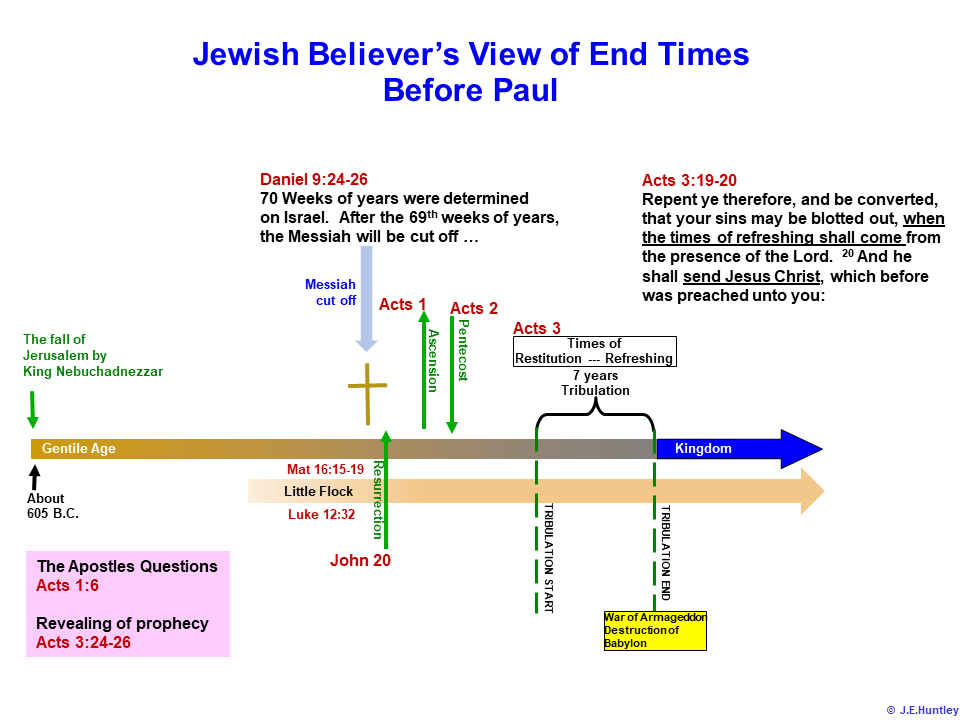
Again, the forgoing timeline only shows what the apostles believed was the order of events based on what they were told by the prophets. There was absolutely no indication in any of the scriptures nor anything Jesus told them, to make them understand that there was going to be an insertion of time where salvation would go to the Gentiles, Romans 11:11. When the apostles asked if He, Jesus, was going to restore the kingdom to Israel, the Lord’s reply was only that it was the Father’s decision when that would occur. After they received the power of the Holy Spirit, they were to be witness of Christ Jesus to Jerusalem, all Judaea, Samaria, and to the uttermost parts of the world, Acts 1:6-8.
However, those in leadership over Israel did not believe, and their hardness of heart against the Lord Jesus Christ, led them to blaspheme the Holy Spirit three times. Jesus warned them against this during His earthly ministry, Mark 3:28-29, Luke 12:10. Three times, men filled with the Holy Spirit appeared before Israel’s leadership and each time the leadership rejected the words from the Holy Spirit speaking through them. The first to appear before Israel’s leadership were Peter and John, Acts 4:1-31, second were all 12 apostles, Acts 5:17-42, then third, the disciple Stephen, Acts 6:12 - Acts 7:1-60. This led to the fall of Israel and the diminishing of the little flock, because of the judgment that fell on Israel for a period of time, Romans 11:11-12 (KJV).
Paul wrote that the blindness in part, happened to Israel until the fulness of the Gentiles comes in, Romans 11:25. This time of the fulness is when the Lord returns in the clouds to snatch up the Body-of-Christ to Himself, both those who died in the Lord and those who are still alive when He returns, and they will be with Him forevermore, 1Thessalonians 4:13-18.
The following timeline shows the events that are expected to occur based on a dispensational view of the end-times. The difference between this timeline with the previous timeline from a Jewish point of view, is the addition of the Body-of-Christ. Otherwise, both timelines are the same. The constituents of the Body-of-Christ are both Jew and Gentile, 1Corinthians 12:13. The end of the dispensation of grace will occur the moment the Lord appears in the clouds to snatch His church up to Him, and be with Him forevermore, 1Thessalonians 13-18. The church will not enter into the tribulation since they are not appointed unto the wrath of God, Romans 5:9, 1Thessalonians 1:10.
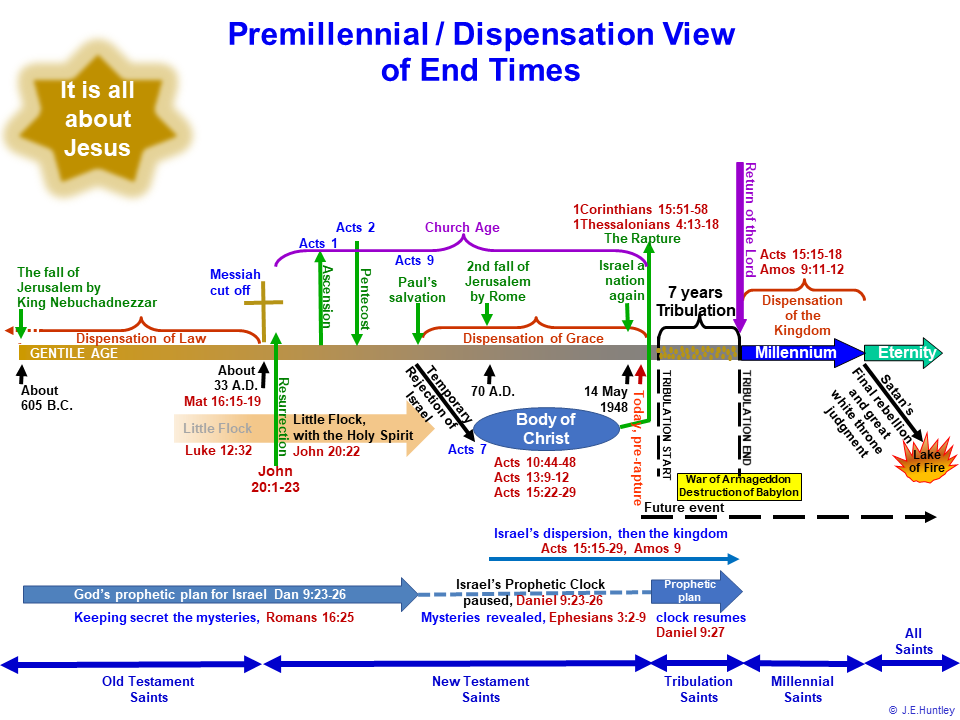
Paul cautions all believers in Christ Jesus concerning this transition from the little flock’s ministry to that of the Body-of-Christ, Romans 11:22. Because of the fall and diminishing of Israel and the little flock, riches came to the Gentiles. Paul then wrote that a time will come after the snatching away of the Body-of-Christ, that Christ Jesus will turn away the ungodliness from Jacob, and take away their sins, Romans 11:26-27. This happens because of the return of belief by the nation of Israel and thereby, Paul looked forward to even greater blessings to Gentiles when Israel is restored, Romans 11:12.
This first part in the examination of the dispensation of grace will focus on the little flock.
The steward:
Peter was the steward at the beginning of the dispensation of grace, John 20:17, and before Israel’s fall, Romans 11:11:
- This dispensation was committed to Peter, Matthew 16:19, to whom Jesus gave the keys of the kingdom of heaven as a steward
The dispensational test was:
- Whosoever shall call on the name of the Lord shall be saved, Acts 2:21
- Repent and be baptized in the name of Jesus Christ for the remission of sins, and they shall receive the gift of the Holy Spirit, Acts 2:38, Acts 3:19
- Then the times of refreshing shall come from the presence of the Lord, for Jesus Christ will return from heaven, Acts 3:19-20
The dispensational failure was:
- God sent His Son into the world, so through Him we might be saved. Those who believed not on Him are condemned already, because they have not believed in the name of the only begotten Son of God, John 3:16-20
- Three times God sent His people full of the Holy Spirit, to the Jewish leadership and their court, yet the leadership rejected each message to repent
- Peter and John appeared Israel’s leadership, Acts 4:1-21
- All 12 Apostles appeared before the high priest and the sect of the Sadducees, Acts 5:17-40
- The martyrdom of Stephen, Acts 6:12-Acts 7:1-60
The dispensational judgment is:
- For as in Adam all die, even so in Christ shall all be made alive, 1Corinthians 15:22
- He that believes on the Lord Jesus Christ shall be saved, but he that does not believe is condemned already because he has not believed the name of the only begotten Son of God, John 3:18-20
- The blindness of Israel has happened in part until the fulness of the Gentiles has come in, Romans 11:25
- Then Israel’s Deliverer (Christ Jesus), will come, turn way ungodliness from Jacob, because of His covenant with them, Romans 11:26
- Afterward the kingdom will come, the Lord will establish the beginning of His eternal kingdom, and sit upon the throne of David, judging with a rod of iron, Psalms 2:5-9, Acts 15:15-18
The following graphic illustrates the resumption of the little flock’s ministry after the resurrection of the Lord Jesus Christ. It also shows the simultaneous fall of Israel from God and the diminishing of the ministry of the little flock, Romans 11:11-12, due to the rebellion of Israel against the Holy Spirit’s message to them to repent by the apostles and the disciple Stephen. In the book of Acts, Luke reports most of the little flock’s ministry in Acts chapter 1-7, and he also records their dispersion from Jerusalem due to the persecution by Saul (Paul, Acts 13:9), against believers in Christ Jesus, Acts 8:1. As the believers fled, they spread the Word to Jews only, Acts 11:19. The next discussion will show how the Lord identified and chose Saul to spread the revealed gospel to the Gentiles, and kings and the children of Israel, Acts 9:15.
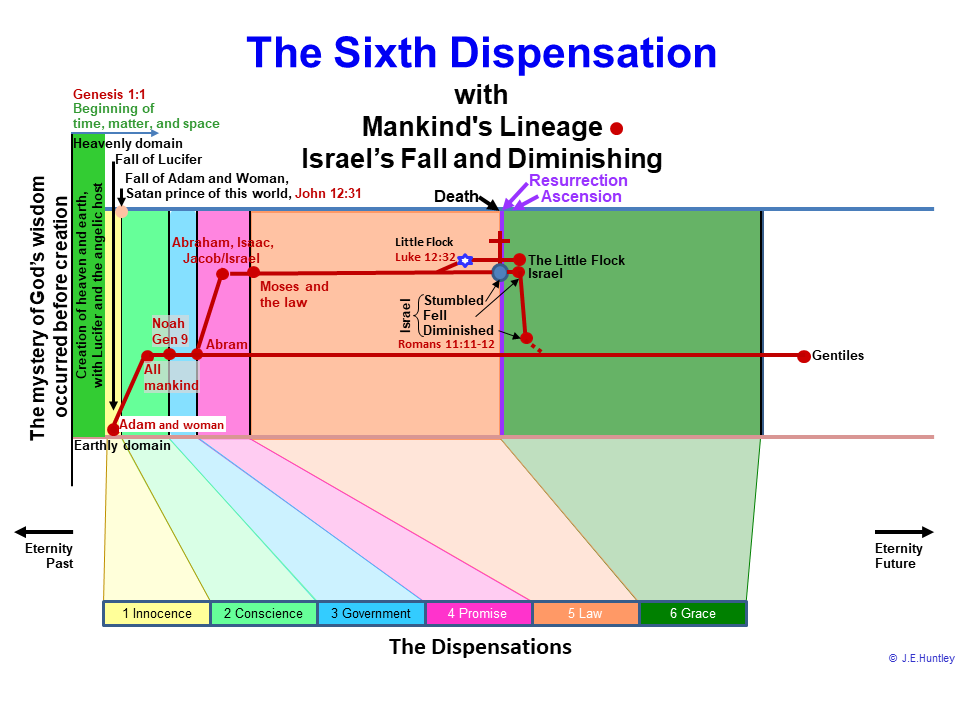
As a result of the fall of Israel, salvation had come to the Gentiles! This transition from the little flock’s ministry to the new ministry to the Gentiles was very short. The Lord selected Saul, who both instigated and the supported Stephen’s stoning, Acts 7:58, Acts 26:9-11.
The fall of Israel resulted in the diminishing of the Jerusalem church and the little flock, so the stewardship in the dispensation shifted to Paul. The apostle Paul is the only person in all of scripture to identify and write about the Body-of-Christ, Romans 12:5, 1Corinthians 12:12, 1Corinthians 12:27, Ephesians 3:6, Ephesians 4:12, Ephesians 5:23, Colossians 1:24, 2:17, as well as the mysteries revealed to him by the Christ Jesus, Galatians 1:11-20, Ephesians 3:1-10.
- The constituents of the Body-of-Christ are Jews and Gentiles who believe in Jesus Christ, 1Corinthians 12:13, Galatians 3:28
- Paul was tasked by God to preach to Gentiles, Acts 9:15-17, Acts 13:46-47, Acts 22:17-21
- Paul wrote to Titus concerning the plan of God, Titus 2:11-14
- Paul told the Philippians that the citizenship for the Body-of-Christ is in heaven, and he wrote in his epistle to the Ephesians, that we are blessed with all heavenly blessing, and made us sit together in heavenly places in Christ Jesus, Philippians 3:20, Ephesians 1:3, 2:6
- A pattern for the Body-of-Christ is seen by:
- Abraham, who sent his servant to find a bride for Isaac, just as the Holy Spirit does now, Genesis 24, Ephesians 5:30-32 (the bride of Christ is the church)
- Believers in Christ, whose body is dead because of sin, but the Spirit is life because of righteousness. The Gentile believers are the sons of God, and have received the Spirit of adoption, where they are heirs of God, and joint-heirs with Christ, Romans 8:10-17
- The end of the dispensation of grace will occur when Christ Jesus returns in the clouds for His church. Then believers in Jesus Christ who have died since Jesus’ resurrection will be raised from the dead to meet with Christ in the clouds, which includes the little flock, John 14:1-4, and those in the Body-of-Christ who have died, 1Thessalonians 4:16-17. Next, believers in Christ Jesus who are still alive, will be snatched away into the clouds to also be with Christ forevermore, 1Corinthians 15:51-54
Saul, who later was called Paul, Acts 13:9, was appointed by God, Acts 9:10-16, 13:46-47, as the apostle to the Gentiles, Romans 11:13, which Paul reinforced in all his epistles. This was not a position he sought after, instead he was chosen by God and given revelation of the mysteries from Christ Jesus to preach among the Gentiles. He did not receive the gospel of grace from any other person, nor did he confer with the 12 apostles in Jerusalem for their opinions, Galatians 1:13-20. Much later Paul wrote to Timothy, explaining how he was first, the chief, to be in the Body-of-Christ, to be a model for all following believers in Christ Jesus to everlasting life, 1Timothy 1:12-16. He also wrote to the Corinthians and other believers describing the particulars of the Body-of-Christ, 1Corinthians 12:27, and that by the Holy Spirit we are all baptized into one body, whether we are Jew or Gentile, bond or free. We have all been made to drink into one Spirit, 1Corinthians 12:13. Paul also wrote to the Ephesians that the Holy Spirit immediately seals those who believe in Jesus, until the day of redemption, Ephesians 1:13, 4:30. That is the day when Christ Jesus returns in the clouds for believers in Christ, both dead and alive, 1Thessalonians 4:13-18.
The two bodies of ministry of Jesus Christ are the little flock and the Body-of-Christ. The little flock began their ministry at the start of the dispensation of grace, and continued until the fall of Israel. They celebrated the new covenant, initiated by Christ Jesus at His last supper with them. He ended the communion with them, pointing to the time that He would drink the wine in His Father’s kingdom, Matthew 26:26-29. The little flock was led by the 12 apostles who were preaching the kingdom message, which was directed to Israel. Israelites were to repent and be baptized to receive the Holy Spirit and to enter into the kingdom of Heaven, Acts 2:38. Peter repeated this message after the lame man from birth was healed. At that time, Peter added to the message the expectation that the Lord would return and establish His kingdom on earth, Acts 3:19-21.
After the fall of Israel, salvation came to the Gentiles, Romans 11:11, through the ministry Paul, who began the Body-of-Christ. This ministry of the Body-of-Christ continues today, until the return of Christ in the clouds to receive the dead in Christ, and those still alive in Christ to Himself, 1Thessalonians 4:13-18. Paul preached the gospel of grace, where a person is saved if they believe that Jesus died on the cross for their sins according to scriptures, was buried, then rose from the dead according to scripture, 1Corinthians 15:1-4. This belief was based on the God’s grace, through the shed blood of Christ Jesus, by faith, Ephesians 2:8-9, and nothing else. Further, God revealed to Paul the ceremony of the last supper to be celebrated by the Body-of-Christ. It is the same as what the Lord gave to the apostles, except the very end. To the apostles in that last supper, Jesus declare that He would not drink from the fruit of the vine until He did so in His Father’s kingdom, Matthew 26:29, which is the Lord’s millennial reign, Revelation 20:6. In contrast, the end of the Lord’s supper that was given to the Body-of-Christ continues until, and looks forward to, the Lord’s return for His church when He appears in the clouds, 1Thessalonians 4:13-18.
What is unique concerning the Body-of-Christ through the annuls of time, is that knowledge of this dispensation was kept secret before the world began, 1Corinthians 2:7, Romans 16:25-26. If the princes of this world (Satan and the fallen angels who follow Satan) had known, they would not have crucified the Lord, 1Corinthians 2:6-10.
Now focusing on the dispensation of grace with the Body-of-Christ:
The steward for the Body-of-Christ in the dispensation of grace:
- This dispensation was committed to Paul, Colossians 1:25, and as a steward of the mysteries of God, 1Corinthians 4:1
- This gospel was directed to all, both Jew and Gentile, who are one in the Body-of-Christ, 1Corinthians 12:12-14, 27, Romans 12:5, Galatians 3:28, Ephesians 4:8-15
- Those whom believe in Christ Jesus are now no longer under any condemnation, who walk after the Spirit, Romans 8:1
The dispensational test is:
- Believing in faith, that by the grace of God are we saved through faith, and not of ourselves lest anyone should boast, Ephesians 2:8
- We are redeemed by the blood of Jesus for the forgiveness of sins according to the riches of His grace, Ephesians 1:7
- We are saved if we keep in memory what Paul preached, that Christ died for our sins according to the scriptures, was buried, and on the third day He rose again according to the scriptures, 1Corinthians 15:1-4
The dispensational failure is:
- Those who do not believe the gospel according to Paul, 1Corinthians 15:1-4, had their minds blinded by the god of this world (Satan), 2Corinthians 4:4
- Man is not justified by the word of the law, but by faith of Jesus Christ, Galatians 2:16
- The preaching of the cross is to them that perish, foolishness, …, 1Corinthians 1:18
- The natural man does not receive the things of the Spirit of God, for they are foolishness to them, neither can they know them for they are spiritually discerned, 1Corinthians 2:14
The dispensational judgment is:
- For as in Adam all die, even so in Christ shall all be made alive, 1Corinthians 15:22
- He that believes on the Lord Jesus Christ shall be saved, but he that does not believe is condemned already because he has not believed the name of the only begotten Son of God, John 3:18-20
Up to this point in this section, the timelines used have been horizontal to show that God was working through Israel to bring about salvation to all mankind. Then Gentiles had two ways toward salvation, to bless Israel, Genesis 12:2-3, or to be identified with Israel through circumcision (become a proselyte Jew), Exodus 12:48. It was through the seed of Abraham, Isaac, and Jacob, that the LORD made covenants with, gave the law, the service of God, and the promises. It was through this progeny of Israel concerning the flesh, that Christ came, who is over all, Romans 9:3-5.
God continued to work with Israel until their fall, Romans 11:11, and then the Lord worked through Paul to begin the Body-of-Christ, through which He was reconciling the world to Himself, 2Corinthians 5:19. The first person to be part of the Body-of-Christ was Paul, who is a pattern to all who would believe on Christ Jesus unto life everlasting, 1Timothy 1:15-17.
Up until the time of Paul’s conversion on the Damascus Road, Acts 9:3-18, almost all Gentiles were lost and outside the commonwealth of Israel, but through the blood of Jesus, both Jew and Gentile believers are now saved by faith, Ephesians 2:3-18. God did not abandon Israel because of their fall, but they were set aside until the fulness of time the Gentiles came in through the Body-of-Christ, Romans 11:25. So rather than show the Body-of-Christ as another line, separated from the line of humanity, it is instead an area that consists of believing Jew and Gentile, 1Corinthians 12:13. Overtime, this area representing the Body-of-Christ increases, and will continue until the Lord returns in the clouds to snatch his church, both the little flock and the Body-of-Christ to be with Him forevermore. This is all represented by the following graphic. This will introduce the next dispensation of the kingdom, which James, the brother of Jesus spoke of, Acts 15:7-18.
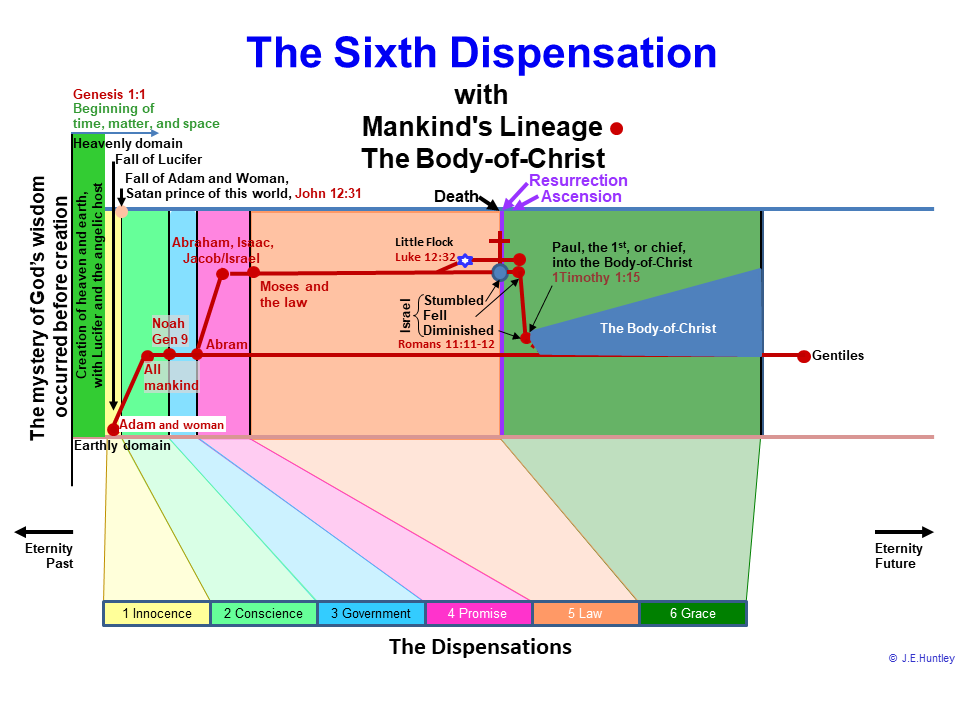
Jesus first spoke of His church at the confession of Peter that He, Jesus, was the Christ, Son of the living God, Matthew 16:18
- The last will and testament of a person is not in effect until the death of the testator, Hebrews 9:16-17
- The new covenant, directed to the house of Israel, was in affect when Jesus died on the cross, Luke 22:20, Jeremiah 31:31, Hebrews 8:8-13
- The church could have only started after the crucifixion of Jesus
- The little flock of believers in Jesus, Luke 12:32, served as the kernel for the early church, which was Jewish and in Jerusalem beginning in numbers of about 120, Acts 1:15, 12, which included the 11 apostles, Acts 1:26 (Matthias was added to the 11 apostles soon after the Lord's ascension, Acts 1:16-26)
- The term church is associated with the children of Israel while in the wilderness, Acts 7:38, but the preponderance of how this term is used relates to the assembly of those who believe in the Lord Jesus Christ
- The apostles and disciples first received the Holy Spirit when Jesus breathed on them after His resurrection and His first appearance to them, John 20:19-22
- Then they received the power of the Holy Spirit, Acts 1:4-5, Acts 2:1-4
The church began in Jerusalem the day Jesus Christ was resurrected and breathed the Holy Spirit upon the apostles, but the power of the Holy Spirit came on Pentecost. However:
- Despite the great demonstration of the Holy Spirit to Israel upon the “little flock,” and the added numbers on the day of Pentecost, it was still a small remnant who believed on Jesus as their Messiah, Acts 1:14-Acts 2:41
- The leadership of Israel were witnessed by the Holy Spirit, first by Peter and John, Acts 4:1-23, then by the 12 apostles, Acts 5:17-41, and finally by Stephen, Acts 6:12-7:1-60. On all three occasions, the Jewish leadership rejected the three messages of the Holy Spirit
- On the third occasion, Stephen saw and proclaimed for all to hear that the Son of Man was standing on the right hand of God, Acts 7:56
- Standing indicates pending judgment, Isaiah 3:13-15, James 5:9, Amos 9:1, Psalms 68:1
- The Lord would judge Israel for their sin of disobedience to the Holy Spirit, and soon disperse them worldwide, Deuteronomy 30:1
- However, the Lord will return Israel to their land in the kingdom age because God chose them to be a particular people, Deuteronomy 14:2
- Saul, before his conversion, was seen as part of the crowd against Stephen, and he was encouraging the continued persecution of believers, Acts 7:58
Paul (formally Saul) wrote to the church in Rome on the state of the nation of Israel, and how they stumbled. They were given an opportunity to repent and believe, but since they refused, salvation went out to the Gentiles, Romans 11:11
- God used His grace to the Gentiles as a means to provoke Israel to jealousy
- God did not reject Israel, He only set aside their prophetic plan that looks forward to the Lord’s kingdom. God’s prophetic plan for Israel will restart, after the dispensation of grace ends, Ephesians 2:2-6. The end of the dispensation of grace occurs when the Lord returns in the clouds to call His church to himself, John 14:1-4, 1Corinthians 15:51-58, 1Thessalonians 4:13-18
- With the setting aside of the prophetic plan for Israel, there was a diminishing of the “little flock’s” kingdom message until the kingdom comes, Romans 11:12
- In the kingdom age, all Israel shall be saved, Romans 11:26
- In the dispensation of the kingdom, Israel will be received by the Lord and placed in a paramount position among all the nations, Romans 11:15
Paul also wrote to the Gentiles concerning the Jews. He used the example of the olive tree, showing how if the branches were holy (Israel), the lump is holy, and if the root (Christ Jesus) was holy, then so are the branches. So, because of unbelief in Christ Jesus, some of the natural branches on the olive tree were broken off so the Gentiles from a wild olive tree could be grafted by faith into the olive tree. Paul warned the Gentiles not to be high-minded because of their position in Christ in comparison to the Jews, because they may be cut off as well due to unbelief. Paul was looking forward to the time when Israel, the natural branch, though dead, would be grafted back in to the olive tree with the Gentiles and come back to life, Romans 11:15-24.
The following timelines reflects the fall of Israel early in the dispensation of grace, but a later timeline of the kingdom will show the reinstatement of Israel, after the church is taken up to be with the Lord in the clouds. Paul further writes that the period of time that the natural branches of Israel were broken off is when they are also blind. Christ Jesus will return in the clouds to call His church to Himself, when the fulness of the Gentiles comes in, or when the last Gentile turns from his or her life to believe on Christ Jesus. Afterwards, the nation of Israel will be grafted back into the tree and be a blessing to the world, Romans 11:25, 15.
The following graphic, the same as the previous graphic, illustrates this transition of God working in the world, first through the little flock, then revealed the mysteries to Paul, who then gave them to the Body-of-Christ. The church began with the little flock at the beginning the dispensation of grace, but this ministry was transferred to Paul, who is also a Jew, when Israel fell. Paul was first in the Body-of-Christ, which continues today, 1Timothy 1:15.

Details on the return of Christ Jesus in the clouds to snatch His church up to be with Him forevermore, is elaborated in the section on the mystery program for the Body-of-Christ. Specifically, it is found in the section titled The Mystery of Being Snatched Out (Rapture). The following graphic illustrates these promises given to the Body-of-Christ. This is shown with the vertical blue box labeled rapture. This leads to the event when the church becomes the Bride of Christ, shown by the blue horizontal blue bar.
>